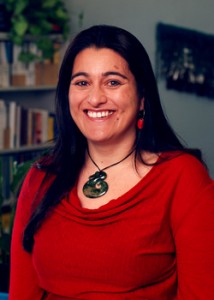“..when you’re working at a University institution you can say that you are doing research on behalf of Maori but the University can also protect you quite a bit. What I like about where we are now is that we’re directly accountable to the people that we say we work for.”
Recently I got to talking with Amohia Boulton about her work within the Māori research arena, what drives her in that work and what makes it both important and meaningful to work with different whānau providers and Iwi.
Amohia Boulton (Ngāti Ranginui, Ngai te Rangi, Ngāti Pukenga, Ngāti Mutunga) is a Senior Researcher and Associate Director at Whakauae Research for Māori Health and Development, a small tribally-owned and mandated Iwi research centre based in Whanganui. “Owned by the Iwi of Ngāti Hauiti, the centre’s mission is to successfully lead and deliver Iwi-based research founded on academic excellence, mātauranga Māori and strong relationships with Iwi, in a manner that effectively amplifies the potential of all Māori”(Whakauae Research Services Ltd, 2013).
Amohia has a policy background and this has fuelled her academic interest in public administration and the contracting, management, and financing of health services, particularly Māori health services. Amohia is currently leading the Whānau Ora Action Research with Te Taiwhenua o Heretaunga, along her with colleagues Gill Potaka Osborne (Whakauae) and Teresa Taylor (T&T Consulting Ltd).
How long have you worked for Whakauae?
“I have been working here since 2008, a wee while now. I left Massey to pretty much go and work with Heather Gifford– the Director.”
How long have you been working with Heather?
“We both did our PhDs at Massey together for the Research Center for Māori Health and Development, which was run by Chris Cunningham, and I think she was maybe a year ahead of me in terms of PhD completion. I completed in 2005 and she completed in 2004 and we got to know each other then. We both did Postdocs at the same time as well – mine at Massey and hers through Te Rūnanga o Ngāti Hauiti.”
“I really liked her values and the fact that she was working for Iwi and so when an opportunity came up to work for her organisation I jumped at it.”
So what made you want to work in this area?
“The fact that when you’re working at a University institution you can say that you are doing research on behalf of Māori but the University can also protect you quite a bit. What I like about where we are now is that we’re directly accountable to the people that we say we work for. So when we say we work for Iwi, we have to front up to them and explain what we’re doing and how we’re doing it and what our results mean.
[We have a] much closer relationship to the people that we say that we’re working for.
Whakauae is a highly ethical organisation with a great deal of integrity.”
So you’re working with different Whānau Ora Collectives?
“When we first put in to be Action Researchers we didn’t think that we wouldwork with many different collectives. The process changed, we would have been really happy to just work with Te Oranganui- which is a health care provider based in Wanganui, [but things turned out differently]. [We ended up working] with Te Oranganui, the Taranaki Ora collective and then the one that I’m leading now is with TeTaiwhenua in Heretaunga.
There was a selection process where the providers got to select researchers that they wanted to work with. That’s how it all got matched up. The providers got a list of all the research groups that had put in to be action researchers so the providers got to choose who they wanted to work with.
We knew that the Whanganui lot were going to choose us but Taranaki and Heretaunga kind of came out of the blue. We had to quickly rethink how we were going to cover all three areas. Te Oranganui and Taranaki Ora have finished now so Heretaunga is the last one for us and we’re just now in the final phase of fieldwork for the last report to TPK. By June this year that’ll be all wrapped up for us.
When I think about it, it started out for us back in 2010 when we first had to put in our application so yeah, it’s been a long process, but interesting.”
This is a two article piece on Amohia Boulton. In the next piece we will look at what she has learned from working with whānau service providers. She will also share some advice for those who are embarking into similar areas of work.

